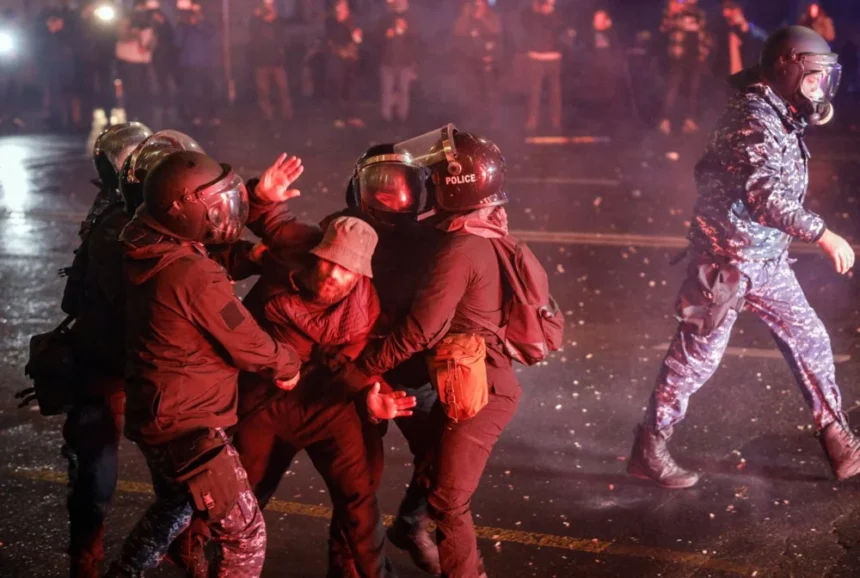Georgia is facing a critical moment, as large state institutions, companies, and services have begun to speak out against the government for its stance on European integration and ties with Russia. This shift follows the controversial suspension of negotiations with the European Union (EU) announced by Prime Minister Irakli Kobahidze on November 28. His statement sparked massive protests and clashes in the streets of Tbilisi, with demonstrators determined to force a change in policy.
Initially, Kobahidze claimed that Georgia had suspended dialogue with the EU, but later retracted his statement, calling it “a lie.” Many demonstrators, however, believe his first comment revealed the government’s true intentions to halt European integration and strengthen ties with Russia.
The catalyst for this unrest was a resolution by the European Parliament, which refused to acknowledge the disputed results of Georgia’s October parliamentary elections. The non-binding resolution called for sanctions against several key Georgian figures, including billionaire Bidzina Ivanishvili, founder of the ruling Georgian Dream party, as well as Prime Minister Kobahidze, Parliament Speaker Shalva Papuashvili, and other members of the ruling elite.
The Georgian Dream party’s stance has been warmly received in Moscow, with Russian media claiming that “Russia has won against the EU on its own turf.” Russian President Vladimir Putin also praised the Georgian government’s decision to defend its position, particularly with regard to a controversial law on foreign agents.
Opponents of the government have responded strongly, with outgoing President Salome Zurabishvili labeling the suspension of EU integration efforts as an unconstitutional coup. Public opinion polls consistently show that over 80% of Georgians support EU membership.
As tensions escalated, the police began to mobilize in central Tbilisi, prompting Zurabishvili to approach the police line and ask, “Are you serving Russia or Georgia? Who did you swear allegiance to?” That night, the authorities ordered the police to use brutal tactics against protesters, leaving hundreds injured, including demonstrators and journalists.
The fallout from Kobahidze’s decision continues to reverberate. Thousands of employees from various state institutions, including the Ministry of Foreign Affairs, Ministry of Defense, Ministry of Education, and the judicial system, have voiced their opposition to the suspension of EU talks. Additionally, several diplomats, including Georgia’s ambassador to the United States and a deputy foreign minister, have resigned.
For the first time, major private companies in Georgia, including the country’s largest banks, telecommunications firms, and educational institutions, have publicly opposed the government. Even some clergy members of the Georgian Orthodox Church have condemned the anti-European decision and the subsequent repression of protesters.
The social reaction has surprised many outside of the ruling party, with some even describing it as a bold step toward rejecting European integration. As Georgia’s path forward remains uncertain, there are growing fears that the country is at a crossroads between aligning with the EU or falling further under Russia’s influence.
While the government insists that sanctions from the West will not affect its position, the European Union and the United States have made their displeasure clear. The EU’s new High Representative for Foreign Affairs, Josep Borrell, condemned the use of violence against protesters and warned that the government’s actions would have direct consequences. On November 30, the United States suspended its strategic partnership with Georgia, further isolating the country.
With Georgia’s public overwhelmingly pro-European, the government faces significant pressure to reconsider its approach. The prospect of returning to Russia’s sphere of influence is a future that many Georgians are unwilling to accept, as they continue to fight for a European future.







